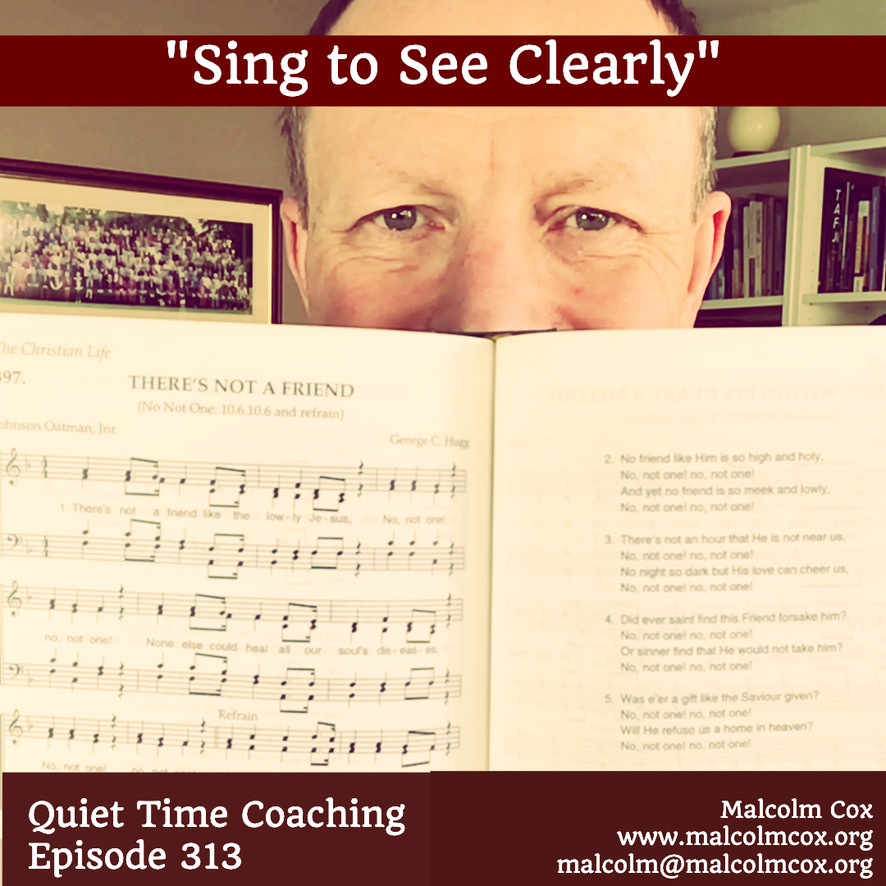Quiet Time Coaching: Episode 110

“Blessed are those who mourn, for they will be comforted.”
(Matthew 5:4 NIV11)
What does it mean that mourners will be comforted? And how is this connected to the kingdom of heaven?
In this series we are immersing ourselves in the beatitudes – Matthew 5:3-12. We’re trying to figure out what each beatitude means for us practically and how that affects our relationship with God, and in particular, our times of quiet with God.
The reason this is on my mind is because I am preparing a teaching and preaching series for the Thames Valley churches of Christ, and a teaching day for the Watford Church of Christ based on the sermon on the mount.
Join me today as I examine what it means to mourn and to be comforted.
1. Overview
This second beatitude follows naturally from the previous one. When we recognise our poverty, and the poverty of the world, it will cause us to mourn.
Is mourning appropriate for a Christian? Shouldn’t we be people characterised by joy? Certainly, we are offered the joy of Jesus (John 15:11).
However, Christians are not called to a kind of perpetual, glib smile. Jesus shed tears, and plenty of experiences in our lives make tears appropriate.
We are promised joy, yes, but a joy (blessedness) that comes from the Spirit (Galatians 5:22).
Let’s take a deeper look at the issues of mourning and comfort.
2. Mourn
The first question to answer is, “What kind of mourning is envisaged here by Jesus?” Let’s first consider what it may not be.
a. It’s not about grovelling self-pity. Nothing in the Scriptures indicates that Jesus thought this was a healthy state. What God made is “good”. Damaged, certainly, but not irredeemable.
b. It’s not about a ‘religiousness’ that moans about the state of the world. In other words, we are not those who point at the world with an attitude of condemnation. For, if we condemn the world, surely we condemn ourselves. We are no less worthy of condemnation than any at whom we might point.
So, what kind of mourning might Jesus have in mind?
a. On a personal level it’s healthy to mourn our sin – Isaiah 6:5, Rom 7:24, Ezra 10:1, Acts 2:36, 1 Cor 5:2, 2 Cor 7:10, 12:21. Our sin hurts God, ourselves, and other people. There are times when it is appropriate not only to acknowledge our sin, but to mourn over it and its consequences. This is the mourning which accompanies repentance.
b. Join Jesus in mourning over the consequences of sin for other people (Luke 19:41). Old Testament people also wept in this way – Ps 119:136, Ezek 9:4, as did Paul – Phil 3:18 & Romans 7.
Now, let’s think about what it means to be comforted.
3. Comforted
Only when we truly mourn our sin can we be truly comforted by God’s forgiveness. Mourning leads to and is a sign of repentance which leads to rejoicing (Acts 3:19). If we understand sin properly and understand grace properly we will mourn deeply and rejoice greatly. One of the Messiah’s jobs was to be ‘the Comforter’ who would ‘bind up the brokenhearted’ – Is 61:1, 40:1.
Some of the promised comfort is now and some comes later.
a. Now. The shepherds are told by the angel: “Do not be afraid. I bring you good news that will cause great joy for all the people.” (Luke 2:10 NIV11), and Jesus tells his followers: “Do not be afraid, little flock, for your Father has been pleased to give you the kingdom.” (Luke 12:32 NIV11) These are words of comfort connected to the promise of the one who would bring what Simeon was waiting for, “the consolation of Israel” (Luke 2:25 NIV11).
b. Later. There is a gap between a measure of comfort we receive now, and the ultimate fulfilment of comfort which comes in the next life. “For the Lamb at the centre of the throne will be their shepherd; ‘he will lead them to springs of living water.’ ‘And God will wipe away every tear from their eyes.’” (Revelation 7:17 NIV11). The tension between the two is expressed well by what Paul writes to the Romans: “I consider that our present sufferings are not worth comparing with the glory that will be revealed in us.” (Romans 8:18 NIV11)
The Word Biblical Commentary sums up Matthew 5:4 well: “Those who mourn do so because of the seeming slowness of God’s justice. But they are now to rejoice, even in their troubled circumstances, because their salvation has found its beginning. The time draws near when they shall be comforted (cf Rev. 7:17; 21:4), but they are already to be happy in the knowledge that the kingdom has arrived. Their salvation is at hand.” Hagner, Donald A. Matthew 1–13. WBC 33A. Accordance electronic edition, version 1.5. Grand Rapids: Zondervan, 2000.
4. Application
How can this beatitude find its appropriate application to our times of quiet with God? Four possible applications occur to me for our times of prayer:
a. Connect with the consequences of sin in your life. Talk to God about any recent sin that’s on your heart and conscience. Not to dwell on it, not to wallow in self-pity, not to enjoy some perverse and inappropriate enduring guilt, but to create soberness, a reminder of the need for God’s grace, resulting in a thankfulness and gratitude for the kindness, patience and mercy of our Abba Father through Jesus his Son, our redeemer-King.
b. Connect with the consequences of sin in this world. Not to condemn the world, but to stimulate urgency in your prayers for God’s intervention. Check the news at least often enough to know what’s going on and what to pray about. Pray for “kings and all those in authority” (1 Timothy 2:2 NIV11) as well as situations in your own town, country or the world where we find significant tension, disharmony or pain.
c. Connect with the promise of comfort provided in the here and now by the Holy Spirit (John 16:7). Rejoice in prayer, thanking God that the Spirit of Jesus is with you today and that you can trust in his comforting promise: ““Come to me, all you who are weary and burdened, and I will give you rest. Take my yoke upon you and learn from me, for I am gentle and humble in heart, and you will find rest for your souls. For my yoke is easy and my burden is light.”” (Matthew 11:28–30 NIV11)
d. Connect with the promise of comfort still to come. “‘He will wipe every tear from their eyes. There will be no more death’ or mourning or crying or pain, for the old order of things has passed away.”” (Revelation 21:4 NIV11) Pray with joyful anticipation looking forward to the fulfilment of that promise.
Mourning and comfort go together. There are spiritually compatible and healthy. Do we try to create her own comfort instead of allowing God to be our comforter on the basis of our own commitment to mourning? What difference might it make to your times of quiet with God to incorporate some regular mourning? Perhaps it would bring you a greater, fuller more powerful experience of God’s comfort.
Let me know what you learn from incorporating some mourning into your devotional times with your heavenly Father.
“Wait for the LORD” retreat update
Registration is open to all for the, “Wait for the LORD” retreat, 27 – 29 March 2020. You can find details on the dedicated retreat page on my website and in previous podcasts. Six of the 17 available places have gone. Eleven remain. If you’d like to come, drop me a line via email and I will tell you how you can make payment.
Please add your comments on this week’s topic. We learn best when we learn in community.
Do you have a question about teaching the Bible? Is it theological, technical, practical? Send me your questions or suggestions. Here’s the email: malcolm@malcolmcox.org.
If you’d like a copy of my free eBook on spiritual disciplines, “How God grows His people”, sign up at my website: http://www.malcolmcox.org.
Please pass the link on, subscribe, leave a review.
God bless, Malcolm
PS: You might also be interested in my book: “An elephant’s swimming pool”, a devotional look at the Gospel of John


